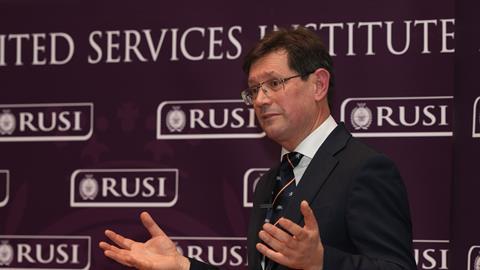Paying whistleblowers could speed up the Serious Fraud Office’s work, the agency’s director has said in his first speech in the role.
Nick Ephgrave said last night that if the SFO was ‘serious about cases being quicker’, the organisation would ‘need to focus on intelligence and evidence’.
Speaking at the Royal United Services Institute (RUSI) on Tuesday Ephgrave gave ‘two possible suggestions’ on how to speed up the process of SFO cases from investigation to prosecution: financial incentives for whistleblowers and making ‘better use of assisting offenders legislation’.
He said: ‘If we’re serious about SFO cases being quicker, then we need to focus on the intelligence and evidence. Our cases, which maybe take five to six years, how much quicker would they be if we could access what we might call “smoking gun” evidence from an insider who was actually there when it happened, saw what happened…that has the documents that prove the case? How much quicker would it be if we could access that or how might we do that?
‘I’ll give you two possible suggestions. RUSI, our host tonight, is actually developing research on the idea of incentivisation of the whistleblower. I think we should pay whistleblowers.
‘If you look at the example in America, I know not everything in America is entirely transferable here, but the American system allows that, and I think something like 86% of the $2.2bn of…prosecutions have come from whistleblowing information reports at that first stage.
‘I happen to know that since 2012, 700 UK nationals have gone to America to whistleblow because they feel they cannot do it here because there isn’t incentivisation.
‘I would invite us – not just the SFO – but invite us to think on this policy and think about whether we want to consider incentivising whistleblowing. I think it has many benefits.’
Later, Ephgrave said the ‘benefits outweigh the disadvantages’ when considering paying whistleblowers and acknowledged ‘how difficult it is to be a whistleblower’.
‘If you’re a genuine whistleblower, and if you know that if you do speak out there is a chance - not a certainty - that there will be some compensation for you, so financially to a degree you will be insured, I think that gives a bit of incentive. It is not easy for them to do this, even if morally it is the right thing to do. I don’t think it is as simple as to say “people should do the right thing”.’
He added: ‘Aligned to that I suppose, and again you’re looking with one eye across the Atlantic, we have fantastic legislation here which allows us to encourage assisting offenders to provide evidence or information to help us progress investigations.
‘In America it is kind of done almost without any question. My own research suggests that over here our use of [the] legislation…is not well-developed. We seem reluctant to do it…to do it, it is not used very often and yet the benefits are enormous.’ He added that one of the benefits included for the defendant who ‘can come up with a reasonably decent reduction of sentence’.
‘So, putting those two things together,’ Ephgrave said. ‘Incentivisation of whistleblowers and effective use of the assisting offenders legislation, you’ve got the building blocks there for a much quicker, more efficient way of dealing with these very very complex, big cases.’
This article is now closed for comment.




























9 Readers' comments